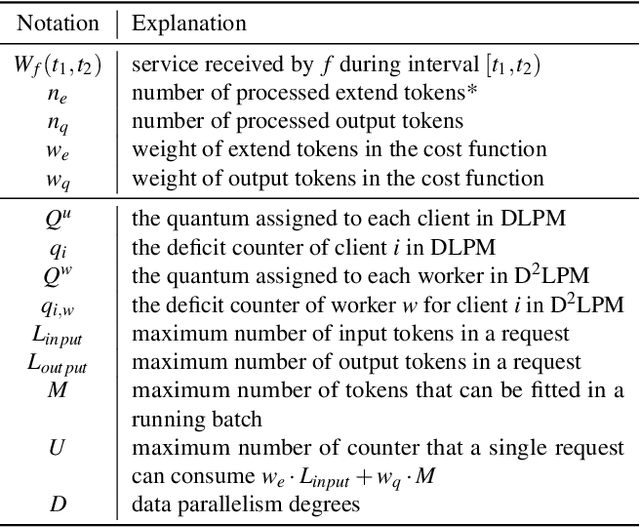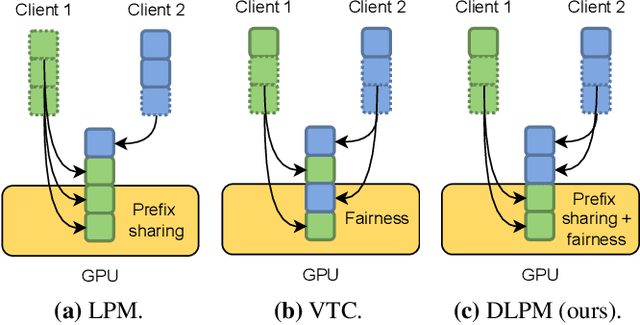Yineng Zhang
When RL Meets Adaptive Speculative Training: A Unified Training-Serving System
Feb 06, 2026Abstract:Speculative decoding can significantly accelerate LLM serving, yet most deployments today disentangle speculator training from serving, treating speculator training as a standalone offline modeling problem. We show that this decoupled formulation introduces substantial deployment and adaptation lag: (1) high time-to-serve, since a speculator must be trained offline for a considerable period before deployment; (2) delayed utility feedback, since the true end-to-end decoding speedup is only known after training and cannot be inferred reliably from acceptance rate alone due to model-architecture and system-level overheads; and (3) domain-drift degradation, as the target model is repurposed to new domains and the speculator becomes stale and less effective. To address these issues, we present Aurora, a unified training-serving system that closes the loop by continuously learning a speculator directly from live inference traces. Aurora reframes online speculator learning as an asynchronous reinforcement-learning problem: accepted tokens provide positive feedback, while rejected speculator proposals provide implicit negative feedback that we exploit to improve sample efficiency. Our design integrates an SGLang-based inference server with an asynchronous training server, enabling hot-swapped speculator updates without service interruption. Crucially, Aurora supports day-0 deployment: a speculator can be served immediately and rapidly adapted to live traffic, improving system performance while providing immediate utility feedback. Across experiments, Aurora achieves a 1.5x day-0 speedup on recently released frontier models (e.g., MiniMax M2.1 229B and Qwen3-Coder-Next 80B). Aurora also adapts effectively to distribution shifts in user traffic, delivering an additional 1.25x speedup over a well-trained but static speculator on widely used models (e.g., Qwen3 and Llama3).
FlashInfer-Bench: Building the Virtuous Cycle for AI-driven LLM Systems
Jan 01, 2026Abstract:Recent advances show that large language models (LLMs) can act as autonomous agents capable of generating GPU kernels, but integrating these AI-generated kernels into real-world inference systems remains challenging. FlashInfer-Bench addresses this gap by establishing a standardized, closed-loop framework that connects kernel generation, benchmarking, and deployment. At its core, FlashInfer Trace provides a unified schema describing kernel definitions, workloads, implementations, and evaluations, enabling consistent communication between agents and systems. Built on real serving traces, FlashInfer-Bench includes a curated dataset, a robust correctness- and performance-aware benchmarking framework, a public leaderboard to track LLM agents' GPU programming capabilities, and a dynamic substitution mechanism (apply()) that seamlessly injects the best-performing kernels into production LLM engines such as SGLang and vLLM. Using FlashInfer-Bench, we further evaluate the performance and limitations of LLM agents, compare the trade-offs among different GPU programming languages, and provide insights for future agent design. FlashInfer-Bench thus establishes a practical, reproducible pathway for continuously improving AI-generated kernels and deploying them into large-scale LLM inference.
Understanding and Steering the Cognitive Behaviors of Reasoning Models at Test-Time
Dec 31, 2025Abstract:Large Language Models (LLMs) often rely on long chain-of-thought (CoT) reasoning to solve complex tasks. While effective, these trajectories are frequently inefficient, leading to high latency from excessive token generation, or unstable reasoning that alternates between underthinking (shallow, inconsistent steps) and overthinking (repetitive, verbose reasoning). In this work, we study the structure of reasoning trajectories and uncover specialized attention heads that correlate with distinct cognitive behaviors such as verification and backtracking. By lightly intervening on these heads at inference time, we can steer the model away from inefficient modes. Building on this insight, we propose CREST, a training-free method for Cognitive REasoning Steering at Test-time. CREST has two components: (1) an offline calibration step that identifies cognitive heads and derives head-specific steering vectors, and (2) an inference-time procedure that rotates hidden representations to suppress components along those vectors. CREST adaptively suppresses unproductive reasoning behaviors, yielding both higher accuracy and lower computational cost. Across diverse reasoning benchmarks and models, CREST improves accuracy by up to 17.5% while reducing token usage by 37.6%, offering a simple and effective pathway to faster, more reliable LLM reasoning.
Locality-aware Fair Scheduling in LLM Serving
Jan 24, 2025



Abstract:Large language model (LLM) inference workload dominates a wide variety of modern AI applications, ranging from multi-turn conversation to document analysis. Balancing fairness and efficiency is critical for managing diverse client workloads with varying prefix patterns. Unfortunately, existing fair scheduling algorithms for LLM serving, such as Virtual Token Counter (VTC), fail to take prefix locality into consideration and thus suffer from poor performance. On the other hand, locality-aware scheduling algorithms in existing LLM serving frameworks tend to maximize the prefix cache hit rate without considering fair sharing among clients. This paper introduces the first locality-aware fair scheduling algorithm, Deficit Longest Prefix Match (DLPM), which can maintain a high degree of prefix locality with a fairness guarantee. We also introduce a novel algorithm, Double Deficit LPM (D$^2$LPM), extending DLPM for the distributed setup that can find a balance point among fairness, locality, and load-balancing. Our extensive evaluation demonstrates the superior performance of DLPM and D$^2$LPM in ensuring fairness while maintaining high throughput (up to 2.87$\times$ higher than VTC) and low per-client (up to 7.18$\times$ lower than state-of-the-art distributed LLM serving system) latency.
FlashInfer: Efficient and Customizable Attention Engine for LLM Inference Serving
Jan 02, 2025



Abstract:Transformers, driven by attention mechanisms, form the foundation of large language models (LLMs). As these models scale up, efficient GPU attention kernels become essential for high-throughput and low-latency inference. Diverse LLM applications demand flexible and high-performance attention solutions. We present FlashInfer: a customizable and efficient attention engine for LLM serving. FlashInfer tackles KV-cache storage heterogeneity using block-sparse format and composable formats to optimize memory access and reduce redundancy. It also offers a customizable attention template, enabling adaptation to various settings through Just-In-Time (JIT) compilation. Additionally, FlashInfer's load-balanced scheduling algorithm adjusts to dynamism of user requests while maintaining compatibility with CUDAGraph which requires static configuration. FlashInfer have been integrated into leading LLM serving frameworks like SGLang, vLLM and MLC-Engine. Comprehensive kernel-level and end-to-end evaluations demonstrate FlashInfer's ability to significantly boost kernel performance across diverse inference scenarios: compared to state-of-the-art LLM serving solutions, FlashInfer achieve 29-69% inter-token-latency reduction compared to compiler backends for LLM serving benchmark, 28-30% latency reduction for long-context inference, and 13-17% speedup for LLM serving with parallel generation.
QQQ: Quality Quattuor-Bit Quantization for Large Language Models
Jun 14, 2024



Abstract:Quantization is a proven effective method for compressing large language models. Although popular techniques like W8A8 and W4A16 effectively maintain model performance, they often fail to concurrently speed up the prefill and decoding stages of inference. W4A8 is a promising strategy to accelerate both of them while usually leads to a significant performance degradation. To address these issues, we present QQQ, a Quality Quattuor-bit Quantization method with 4-bit weights and 8-bit activations. QQQ employs adaptive smoothing and Hessian-based compensation, significantly enhancing the performance of quantized models without extensive training. Furthermore, we meticulously engineer W4A8 GEMM kernels to increase inference speed. Our specialized per-channel W4A8 GEMM and per-group W4A8 GEMM achieve impressive speed increases of 3.67$\times$ and 3.29 $\times$ over FP16 GEMM. Our extensive experiments show that QQQ achieves performance on par with existing state-of-the-art LLM quantization methods while significantly accelerating inference, achieving speed boosts up to 2.24 $\times$, 2.10$\times$, and 1.25$\times$ compared to FP16, W8A8, and W4A16, respectively.
Re-evaluating the Memory-balanced Pipeline Parallelism: BPipe
Jan 04, 2024Abstract:Pipeline parallelism is an essential technique in the training of large-scale Transformer models. However, it suffers from imbalanced memory consumption, leading to insufficient memory utilization. The BPipe technique was proposed to address this issue and has proven effective in the GPT-3 model. Nevertheless, our experiments have not yielded similar benefits for LLaMA training. Additionally, BPipe only yields negligible benefits for GPT-3 training when applying flash attention. We analyze the underlying causes of the divergent performance of BPipe on GPT-3 and LLaMA. Furthermore, we introduce a novel method to estimate the performance of BPipe.
 Add to Chrome
Add to Chrome Add to Firefox
Add to Firefox Add to Edge
Add to Edge